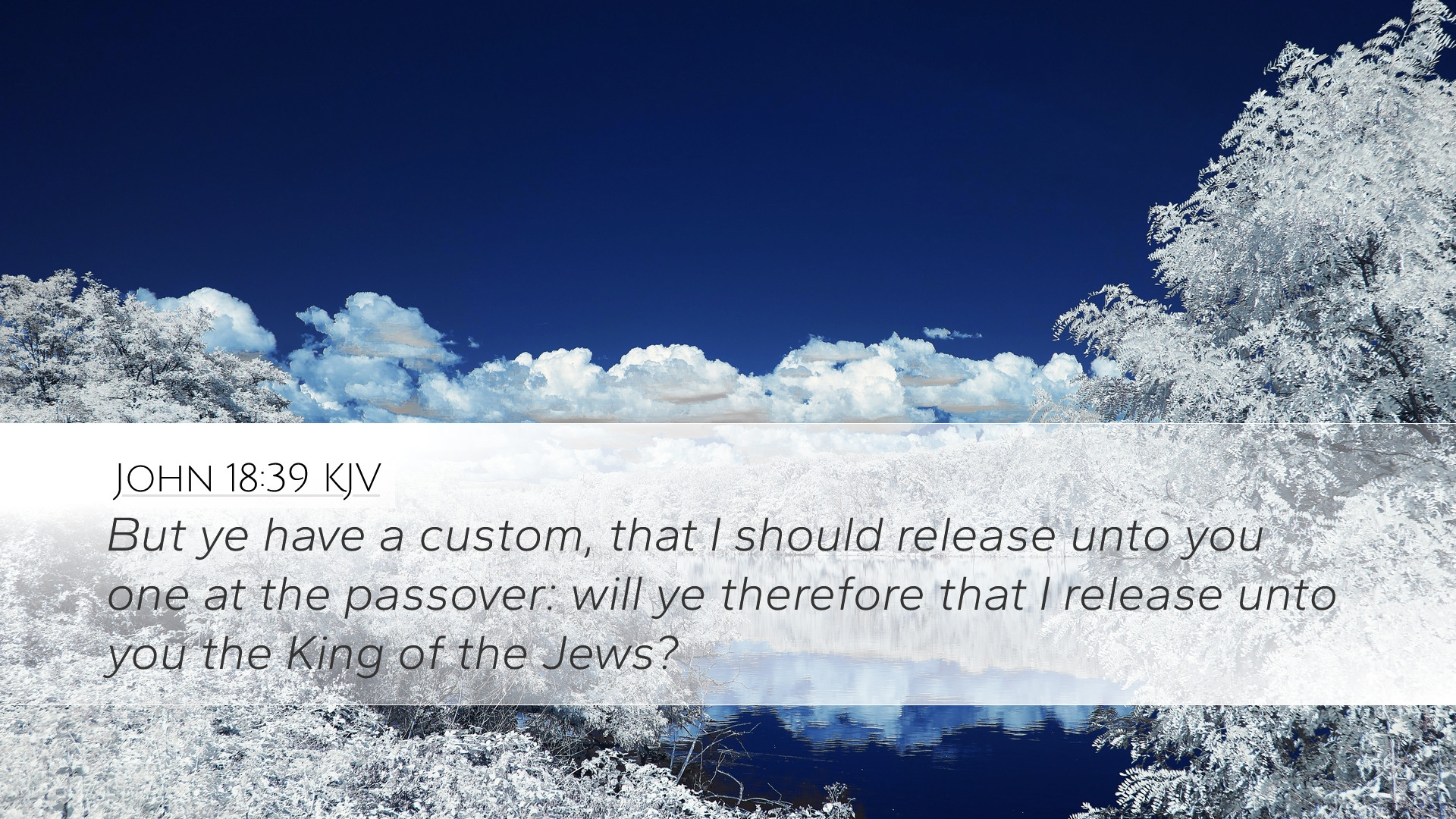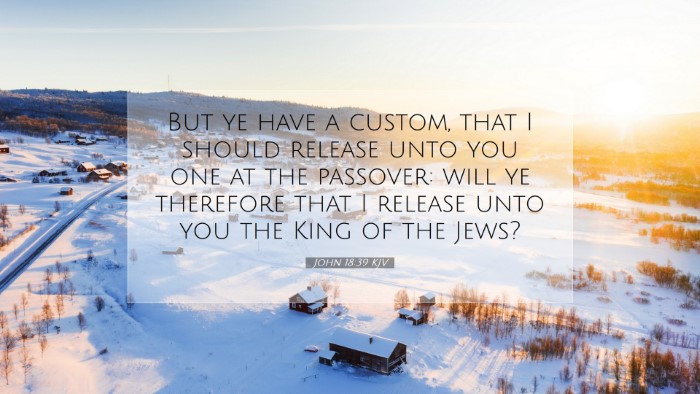Commentary on John 18:39
Verse Context: John 18:39 states: "But you have a custom that I should release someone to you at the Passover. Do you wish then that I release to you the King of the Jews?" This verse occurs during the trial of Jesus before Pontius Pilate, a pivotal moment in the Passion narrative.
Overview and Analysis
The scene presented in this verse is multifaceted and ripe for theological reflection. Pilate, in his role as the Roman governor, faces the challenging task of managing the turbulent dynamics between the Jewish leaders and the largely unyielding crowd.
Custom of Releasing a Prisoner
This "custom" refers to a practice during the Passover in which the Roman authorities would grant clemency to a prisoner, an act intended to appease the Jewish populace. This tradition serves both as a gesture of goodwill and as a political maneuver to maintain control over the people.
Significance of Jesus’ Title
Pilate addresses Jesus as "the King of the Jews." This title holds deep significance; it represents a challenge to Roman authority and an acknowledgment of Jesus’ messianic role. The juxtaposition of "king" with the context of Jesus' suffering and eventual crucifixion invokes profound theological insights about kingship and servitude.
Theological Implications
- Human Choice and Divine Sovereignty: Pilate’s questioning highlights the tension between human agency and divine plan. Here we see the populace faced with a choice, illustrating the broader theme of moral and spiritual decision-making that permeates the scriptures.
- Fulfillment of Prophecy: The events echo prophetic declarations about the Messiah. The people’s response to Pilate about whom they wish to be released plays into the fulfillment of prophecy, as they reject the true King in favor of Barabbas, a notorious criminal.
- The Nature of Justice: Pilate’s dilemma reflects questions of justice and morality. His attempts to navigate the political landscape speak to the ethical complexities encountered in leadership. His question reveals the futility of worldly justice juxtaposed with divine righteousness.
Insight from Public Domain Commentaries
Matthew Henry's Commentary
Henry reflects on the significant irony of the moment: the true King of the Jews is being subjected to the judgment of worldly authorities. He emphasizes that the choice presented to the people not only illustrates their ignorance but also their rejection of divine authority. Henry suggests this moment encapsulates humanity's propensity to choose rebellion over grace, as evidenced in the selection of Barabbas over Jesus.
Albert Barnes' Notes on the Bible
Barnes delves into the implications of the phrase "the King of the Jews." He notes that Pilate, through his questioning, unwittingly exposes the misunderstanding and disillusionment surrounding Jesus’ identity. His commentary underscores the juxtaposition between Jesus’ peaceful kingship and the violent expectations of the people. Barnes also points out that the custom reveals an opportunity for redemption, one that the crowds ultimately shun in favor of choosing Barabbas.
Adam Clarke's Commentary
Clarke highlights the political motivations behind Pilate's question. He notes that Pilate's reference to the “custom” reveals not only an attempt to placate the Jews but also an acknowledgment of their desire for a messiah—albeit one who would deliver them from Roman oppression. Clarke presents this moment as a poignant illustration of how Jesus' kingship is misunderstood. He discusses the implications of choosing a murderer over the Savior and how this resonates throughout the New Testament church's understanding of rejecting Christ.
Conclusion
John 18:39 serves as a rich tableau for reflection on pivotal themes such as choice, authority, and the nature of Christ’s kingship within the framework of sin and redemption. This verse underscores the multiplicity of human motivations and the stark contrast between earthly and divine justice.
As pastors, students, theologians, and scholars engage with this text, they are invited to ponder the implications of their own choices in light of the gospel message. This moment in the Passion narrative serves to remind us all of our continual need for reflection, repentance, and a deeper understanding of Christ, the true King.


